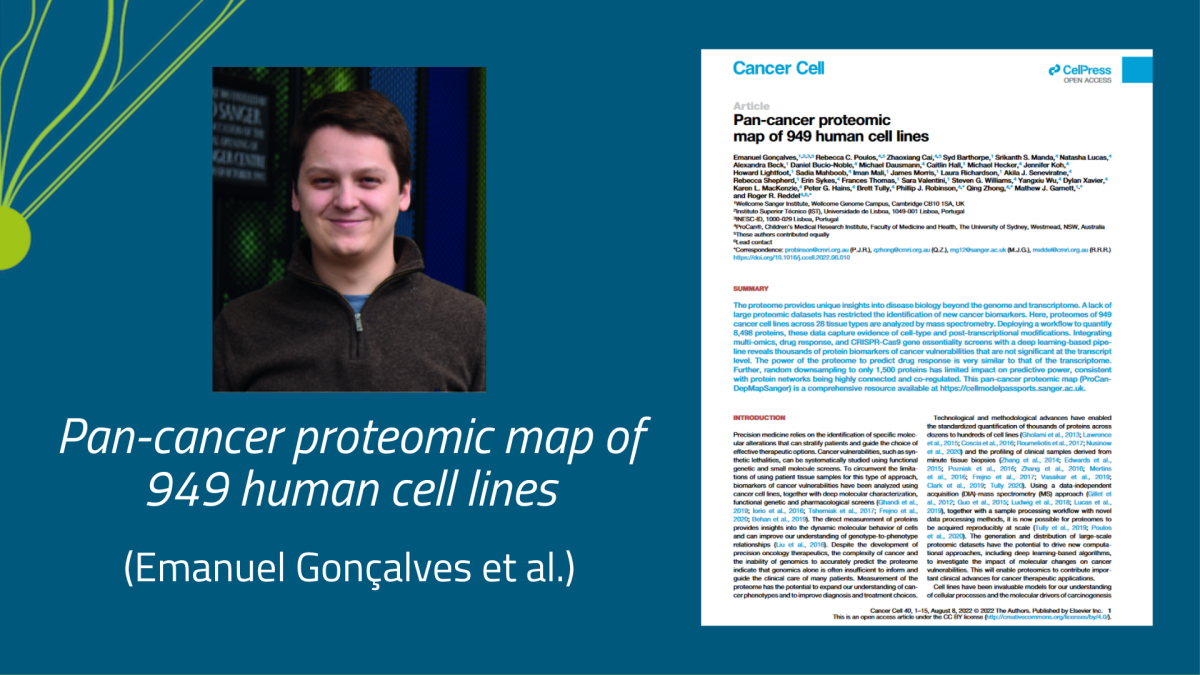
Tell me what your proteome is and I’ll tell you what you are: the proteomic maps of 949 human cancer cell lines
Emanuel Gonçalves — INESC-ID Automated Reasoning and Software Reliability (ARSR) computational biology researcher — has published a groundbreaking study in the journal Cancer Cell (published online 14 July 2022).
In the article Pan-cancer proteomic map of 949 human cell lines, the last study resulting from Gonçalves’ postdoctoral work at the Wellcome Sanger Institute, Gonçalves — together with co-first authors Rebecca C. Poulos and Zhaoxiang Cai and an immense and interdisciplinary group of colleagues — addressed one substantial gap in cancer research: until now a comprehensive characterization of the proteomes of cancer cells was lacking, an absence that substantially limited the identification of novel cancer biomarkers (the molecular signature that each tumour produces).
To tackle this challenge, the team profiled the proteomes — the complete set of proteins expressed by a genome — of 949 cancer cell lines from 28 different tissues using mass spectrometry (a technique used to identify individual molecules in a complex solution based on their unique mass-to-charge signature). Then, analysing some 8,498 proteins within an integrated strategy bringing together multi-omics with drug response and the CRISPR-Cas9 gene editing technology (to manipulate the expression of genes one by one and look at how essential each of the respectively expressed proteins was), Gonçalves and his colleagues revealed thousands of protein biomarkers of cancer vulnerabilities (those molecular changes that promote tumour development and progression, such as those in genes responsible for cell proliferation).
“This study significantly expands our molecular knowledge of cancer cells — more than doubling the number of cancer cell lines with proteomes characterized so far — and of protein regulation in cancer,” Gonçalves shared with us. “Complementing genomics, this dataset provides unique information only captured at the protein level, which we would be missing otherwise, with several important applications, from more accurate therapeutic biomarkers to unique insights into protein associations.”
A study of this dimension, technical complexity and impact inevitably results in game-changing and novel ways of looking at cancer diagnosis, study and potential treatments. As Gonçalves reminded us, “As part of the Cancer DepMap effort, this enables a proteomic lookup map to study cancer, from identifying potential therapeutic biomarkers to studying fundamental processes of protein regulation. This will hopefully become an important resource for the broad community.” Importantly, this pan-cancer proteomic map (ProCan-DepMapSanger), an invaluable resource, is already available online.
And how is Gonçalves’ future research progressing from this major paper? “Looking forward, I’m interested in continuing the work of harnessing these large scale datasets and their integration. There are biological mechanisms that can only be studied and understood when taking a holistic approach integrating multiple molecular datasets, like the one we present here.”
Interdisciplinarity is key in tackling the biggest challenges in contemporary biomedical science. The joining together of computational and molecular biology approaches represents one such unique hope — that of fully tackling the emperor of all maladies.
